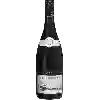
François Plouzeau - Domaine de La GarrelièreGamay Sans Tra LaLa
In the mouth this red wine is a powerful with a nice balance between acidity and tannins.
This wine generally goes well with pork, poultry or beef.
Taste structure of the Gamay Sans Tra LaLa from the François Plouzeau - Domaine de La Garrelière
Light | Bold | |
Smooth | Tannic | |
Dry | Sweet | |
Soft | Acidic |
In the mouth the Gamay Sans Tra LaLa of François Plouzeau - Domaine de La Garrelière in the region of Loire Valley is a powerful with a nice balance between acidity and tannins.
Wine flavors and olphactive analysis
On the nose the Gamay Sans Tra LaLa of François Plouzeau - Domaine de La Garrelière in the region of Loire Valley often reveals types of flavors of cherry, smoke or earthy and sometimes also flavors of red fruit, strawberries or leather.
Food and wine pairings with Gamay Sans Tra LaLa
Pairings that work perfectly with Gamay Sans Tra LaLa
Original food and wine pairings with Gamay Sans Tra LaLa
The Gamay Sans Tra LaLa of François Plouzeau - Domaine de La Garrelière matches generally quite well with dishes of lamb, pork or poultry such as recipes of imene's tunisian ojja, penne à la toscane or chicken liver cake.
Details and technical informations about François Plouzeau - Domaine de La Garrelière's Gamay Sans Tra LaLa.
Discover the grape variety: Gamay noir
Gamay is a Burgundian grape variety that has existed since the 14th century. For fear of competition with the pinot noir of Burgundy, gamay was finally uprooted and planted in the Beaujolais region, from Mâcon to Lyon. These siliceous and granitic soils suit it perfectly, and it gives its best here. But it is also planted all over France, such as in Lorraine, in the Loire Valley, in Bugey, in Savoie and in Auvergne. Gamay is early and very productive and needs to be limited so that quality prevails over quantity. Short winter pruning of the shoots and high density of vines per hectare are the methods that allow it to produce very fruity, fresh and greedy red wines. Gamay is also very popular in red wine futures, and produces wines from the Beaujolais region with very interesting character and ageing potential. The AOCs Crémant-de-Bourgogne, Mâcon, Anjou, Touraine, Rosé de vallée de la Loire, Côtes-d'Auvergne, Saint-Pourçain, Bugey, Gaillac, Côtes du Luberon... and many vins de pays are proud of it. Today, about 36,000 hectares of Gamay are cultivated in France, including 22,000 hectares in Beaujolais.
Last vintages of this wine
The best vintages of Gamay Sans Tra LaLa from François Plouzeau - Domaine de La Garrelière are 2014, 2021, 2020, 2019 and 2018.
Informations about the François Plouzeau - Domaine de La Garrelière
The François Plouzeau - Domaine de La Garrelière is one of of the world's greatest estates. It offers 21 wines for sale in the of Touraine to come and discover on site or to buy online.
The wine region of Touraine
The wine region of Touraine is located in the region of Centre Loire of Loire Valley of France. Wineries and vineyards like the Domaine Famille Bougrier or the Domaine Joel Delaunay produce mainly wines white, red and sparkling. The most planted grape varieties in the region of Touraine are Cabernet franc, Gamay noir and Chenin blanc, they are then used in wines in blends or as a single variety. On the nose of Touraine often reveals types of flavors of grapefruit, tar or kiwi and sometimes also flavors of lime zest, lychee or asparagus.
The wine region of Loire Valley
The Loire Valley is a key wine region in western France. It follows the course of the Loire River on its Long journey through the heart of France, from the inland hills of the Auvergne to the plains of the French Atlantic coast near Nantes (Muscadet country). Important in terms of quantity and quality, the region produces large quantities (about 4 million h/l each year) of everyday wines, as well as some of France's greatest wines. Diversity is another of the region's major assets; the styles of wine produced here range from the light, tangy Muscadet to the Sweet, honeyed Bonnezeaux, the Sparkling whites of Vouvray and the juicy, Tannic reds of Chinon and Saumur.
The word of the wine: Bouchy
See cabernet franc.












